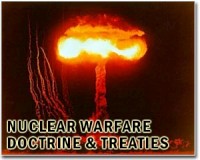 |
Washington (AFP) Dec 9, 2009 The United States and Russia said Wednesday they were closing in on a successor arms reduction treaty that would further slash their nuclear arsenals and put their relations on a more solid footing. "We're getting closer," White House spokesman Robert Gibbs told reporters here, asked about the prospect for an agreement to replace the 1991 Strategic Arms Reduction Treaty (START). "We're optimistic that we can get one." Earlier in Moscow, Russian Foreign Minister Sergei Lavrov assured "the agreement will be signed soon." The former Cold War foes sounded confident notes just days after the START treaty expired with no agreement on a replacement despite intense negotiations to hammer out an accord under guidelines US President Barack Obama and his Russian counterpart Dmitry Medvedev set in July. The presidents set as a goal slashing the number of warheads on either side to between 1,500 and 1,675 and the number of "carriers" capable of delivering them to between 500 and 1,100. The United States has said it currently has some 2,200 nuclear warheads, while Russia is believed to have about 3,000. "We are two decades beyond the fall of the Berlin Wall, and still the United States and Russia deploy more than 2,000 nuclear weapons, many of which are on a high alert status and most of these weapons exist simply to deter their use by the other country," said Arms Control Association executive director Daryl Kimball. "Obviously, the deal should be done well, but it needs to be done. This is a long overdue step." US arms control experts said the intricacies of verification measures were likely holding up an agreement rather than any fundamental differences between the two sides. They predicted negotiators would clinch an according within weeks, if not days. The Russian daily Kommersant cited Russian officials Monday as saying they wanted an agreement by December 18. None of the issues before the negotiators are "particularly hard, or particularly deal breakers," said Linton Brooks, the chief US negotiator of the START treaty. Brooks, who also served under the previous administration of George W. Bush, noted that it took the United States and the Soviet Union four years to negotiate the START treaty, "and essentially all of that time was verification." "Now, (that was a) more complicated treaty, greater suspicion, scenarios we don't worry about any more. Nonetheless, it suggests that what stretches this out is verification." Particularly troublesome was how to count each side's nuclear warheads and verify any agreed reductions. The START treaty does not provide a precedent because it counted only delivery systems, not warheads, and assumed that each bomber, intercontinental missile and submarine carried the maximum number of weapons. The actual number of warheads that each side possesses is believed to be significantly lower than accounted for under START. And the new treaty is designed to measure the actual forces. Russian reports have suggested that the hang-up was Russian demands that the United States end its continuous monitoring of Russia's leading missile production plant in Votkinsk, about 360 miles (580 kilometers) north of Moscow. But Brooks said continuous monitoring at Votinsk no longer served a useful purpose, and the Bush administration had previously concluded it did not want to preserve it. The United States wants to maintain other START verification measures, however, including those requiring notification and transparency about missile tests, he said. Share This Article With Planet Earth
Related Links Learn about nuclear weapons doctrine and defense at SpaceWar.com Learn about missile defense at SpaceWar.com All about missiles at SpaceWar.com Learn about the Superpowers of the 21st Century at SpaceWar.com
 US 'optimistic' on deal with Russia to reduce nukes
US 'optimistic' on deal with Russia to reduce nukesWashington (AFP) Dec 9, 2009 The United States is "optimistic" about reaching a new accord with Russia on limiting the nuclear arsenals of the two superpowers, the White House said Wednesday. Asked about the prospect of agreeing on a successor to the 1991 Strategic Arms Reduction Treaty, spokesman Robert Gibbs told reporters: "We're optimistic that we can get one. "We continue to take part in negotiations with the ... read more |
|
| The content herein, unless otherwise known to be public domain, are Copyright 1995-2009 - SpaceDaily. AFP and UPI Wire Stories are copyright Agence France-Presse and United Press International. ESA Portal Reports are copyright European Space Agency. All NASA sourced material is public domain. Additional copyrights may apply in whole or part to other bona fide parties. Advertising does not imply endorsement,agreement or approval of any opinions, statements or information provided by SpaceDaily on any Web page published or hosted by SpaceDaily. Privacy Statement |